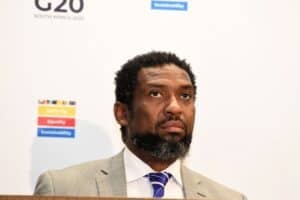According to SAOU spokesperson Chris Klopper, the country had "sighed a collective sigh of relief" after Motshekga's statement.

The Suid-Afrikaanse Onderwysersunie (SAOU) says it is thankful that “rationality triumphed” in the Department of Basic Education’s (DBE) approach to the reopening of schools during the Covid-19 pandemic.
Basic Education Minister Angie Motshekga and her higher education counterpart, Blade Nzimande, briefed the nation on Thursday, outlining the plans to ensure that teaching and learning resume.
The return to school for Grades 7 and 12 from 1 June depends on the department’s plans to ensure that schools are safe and Covid-19-compliant, News24 reported.
According to SAOU spokesperson Chris Klopper, the country had “sighed a collective sigh of relief” after Motshekga’s statement.
The union called it a “relatively rational response” to the various inputs made during the past few weeks on the reopening of schools and the implementation of safety measures as a result of the current lockdown.
“The nerves of teachers and parents were frayed after the barrage of misinformation, fake news and the repeated postponement of the media conference,” Klopper said.
The SAOU said it was grateful that the DBE had not continued with the initial proposal to only provide protective masks to pupils at quintile 1 to 3 schools and not to learners at quintile 4 and 5 schools.
“It also appeared that, initially, the DBE did not intend to provide sanitation packages to quintile 4 and 5 schools. The SAOU had already instructed its legal team to apply for a court order based on Section 28 of the Constitution in regard to the rights of the child that should be of paramount importance in all matters. Thankfully this is no longer necessary.”
Reopening dates ‘sensible’
The union also said the postponement of the dates for the reopening of schools was sensible against the background of the unavailability of masks, sanitation packages for schools, and thermal scanners.
Motshekga said parents had been concerned that pupils would be returning to schools from May, but that it would not be the case.
“The union understands the concern emanating from the fact that Grades 7 and 12 only return to schools on 1 June and that the other grades will be phased in thereafter.”
The SAOU said the important matters that should be borne in mind in this regard were the following:
– Secondary schools regard Grades 11 and 12 as a unit and attempt to complete the curriculum by May of the Grade 12 year, whereafter the balance of the year is used for revision purposes. We believe that it should not be an insurmountable problem, as the cancellation of the June exam and the shortening of the June school holiday will provide extra teaching days for recovery purposes. However, there will be less time for revision.
– For Grade 7, and the other grades, the principle of curriculum trimming is considered. The underlying aim is to focus on the primary building blocks for Grade 8 and the other subsequent grades, i.e. that the primary curriculum building blocks will be focused on.
– The principle of curriculum trimming will also apply for the other grades and the expectation is the curriculum will be completed during the period 2020 and 2021.
– Consideration will be given by the curriculum trimming committees to ensure that the curriculum will be covered for the current grade and the subsequent grade over the next two years and thereby ensure that all the primary curriculum building blocks are covered.
“The statement by [Motshekga] that TVET colleges will open on 1 June was noted, and furthermore that a special project will be implemented to assist these institutions.
“The SAOU is grateful for the fact [that] schools for learners with special education needs (LSEN) were also afforded special attention and not just regarded as an integral part of main stream education. The SAOU worked tirelessly for this sector behind the scenes – we are grateful for this recognition.”
The union said that some schools insisted on reopening earlier. “From a political perspective that will be fatal. It will place the minister in an invidious position,” Kloppers said.
Some schools are not more equal than others
“All citizens and schools are in the same lockdown and to allow certain schools, based on their level of affluence, to continue regardless of the position of other schools is not justifiable.”
Kloppers said this would provide a strong argument during the same year in which the South African Schools Act is amended to change the status of all schools from public schools to state schools.
The union noted that it was concerned that unnecessary pressure would be exerted on teachers to ensure curriculum coverage. “This process will have to be carefully managed to prevent exhaustion.”
It also said the maintenance of a 1.5m social distance parameter would be “complex and very difficult”.
“The identification of asymptomatic learners will likewise be complex, as the [National Institute for Communicable Diseases] stated that 50% to 80% of learners may be asymptomatic. In terms of international research there is little evidence the schools are the epicentres of infections, but that learner transport should be carefully managed to prevent infections between schools and communities.”
The SAOU said as soon as safety measures in schools are in place, the focus will have to shift towards the curriculum and the best options to ensure effective curriculum coverage.
“To assist all communities, the SAOU established an electronic platform for educators, SMTs, SGBs and parents where they can pose difficult questions. We are convinced that such a platform will unleash the power of collective wisdom.”
For more news your way, download The Citizen’s app for iOS and Android.






